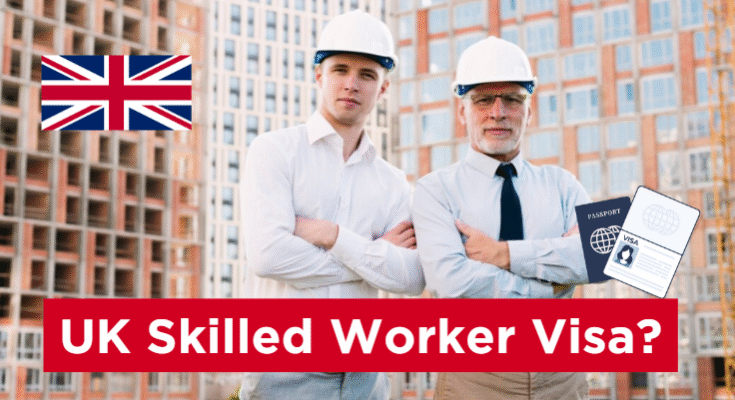The UK Skilled Worker Visa is a work visa that allows foreign workers with the necessary skills to work in the UK for authorized UK employers. The skilled worker visa replaced the Tier 2 visa in late 2020. The scheme is now open to people with skills at RQF level 3 (equivalent to A level in the UK) or above in the relevant occupation.
The UK skilled visa is a long-term work visa that will initially be granted for up to five years (depending on the length of your sponsorship certificate). It is important to note that your visa is only valid for as long as you remain in the same roles as your sponsoring employer. If you want to change jobs or employers, you must apply for a new skilled worker visa.
The Skilled Worker route allows you to extend your visa before it expires and apply for Indefinite Leave to Leave (ILR) after a qualifying period of five years and UK citizenship a year later. If you are planning to apply for a skilled worker visa to the UK, you will need to obtain a job offer and ensure that you meet the eligibility criteria described below.
If a skilled work visa is not right for you, there are alternative work paths you can explore.
Visa for skilled workers vs. Tier 2 work visa
There are several key benefits and differences between the new skilled work visa pathway and the Tier 2 (general) work visa for 2021, including:
- The qualification level requirements have been reduced from RQF level 6 to RQF level 3, greatly expanding the number of occupations suitable for this pathway.
- The new pathway for skilled workers is open to new market entrants (e.g., recent graduates).
- There is no limit on the number of skilled worker visas available in the UK.
- Skilled worker visas do not require a resident labor market test (RLMT), which makes it easier and faster to employ skilled workers abroad.
- The cooling-off period, which meant foreign workers who left the UK had to wait a year before applying for a new work visa, no longer applies.
Visa requirements for UK-skilled workers
Requirements to obtain a visa for skilled workers:
- There is a job offer from a British employer.
- Your employer must be on the list of authorized sponsors approved by the Ministry of the Interior.
- The job you are being hired for must be on the list of qualified occupations.
- You must meet the qualification level requirements, which are at least equivalent to RQF Level 3.
- You must meet the minimum wage requirements of £38,700 a year or the normal rate for your job, whichever is higher.
- You must meet the English language requirements.
- You need £1,270 in your bank account to prove you can stay in the UK.
More information about each of these eligibility criteria is explained below.
1. Get a job offer from a UK employer.
To apply for a skilled worker visa, you must have a valid offer of employment from an authorized UK employer before you apply. You must also have a valid certificate of sponsorship from your UK employer.
2. Your businessman must appear on the list of authorized sponsors approved by the Ministry of the Interior.
Your job offer must come from a company on the Ministry of the Interior’s list of authorized sponsors. It is also important to ensure that your employer is authorized to employ foreign workers under the skilled worker route (permits are issued depending on the type of visa required) and that A-class employers cannot issue new sponsorship certificates until they meet the compliance requirements under the Ministry of the Interior. and will not be upgraded to an A grade. It is recommended that you check this before applying to avoid delays or rejection.
3. You must have been issued a valid “Certificate of Sponsorship” by your employer.
As mentioned above, you must have a valid CoS confirmation from your UK employer to apply for a skilled worker visa.
A Certificate of Sponsorship (CoS) is a digital document that contains information about the role you are sponsoring, including the title and type of your role, start and end dates, gross salary, sponsorship license number, and expiration date.
4. The job you are employed for must appear on the list of subsidized professions.
UK Visas and Immigration will only grant a skilled work visa for roles on the eligible occupations list. You must also have the necessary skills and/or experience for the position you are being recruited for in the UK. To check that your occupation is eligible, you may need to ask your employer for a Standard Occupation Code (SOC).
5. Meet the requirements for the qualification level.
Skilled workers and visa applicants must have skills at least equivalent to RQF level 3 (this is the same as A-level qualifications in the UK). This does not mean that you have to have a certain level of qualification; it means that your skills correspond to RQF level 3 or above.
6. Minimum wage in 2024 for skilled worker visas
The standard minimum salary for a skilled work visa is £38,700. This means your job must pay a standard salary of at least £38,700 or the ‘normal rate’ for your job, whichever is higher. For example, if an employer offers you £39,000 a year, but the annual rate for your job on the eligible occupations list is £40,000, you do not meet the salary requirements for a skilled work visa. Each occupation code has its own annual rate; check the rate for your job in the Home Office rate table.
You may still be eligible for a skilled worker visa with earnings below £38,700 if:
- in your work immigration wages or
- you are a “new entrant” (for example, under 26, studying or having recently completed your studies or vocational training), or
- you have a PhD in science, technology, engineering, or mathematics (STEM) relevant to your work, or
- holds a PhD position in natural sciences or higher education, or
- your work in healthcare or education (other salary rules apply if you work in healthcare or education).
7. Have £1,270 in your bank account to prove you can stay in the UK.
You must provide proof in the form of a bank statement showing that you have spent at least £1,270 in your first month in the UK. In some cases, it may be possible to ask your employer to provide a letter confirming that they will fulfill this requirement on your behalf.
8. Knowledge of English
As an applicant for a skilled worker visa, you must demonstrate that you have sufficient English. This can be achieved in four ways:
- Pass the English test.
- You meet the English language requirements if you take an English test according to the Common European Framework of Reference for Languages (CEFR) at an approved test center. There must be at least a B1 level in reading, comprehension, and oral and written expression.
- Academic degree
- You will also meet the English language requirement if you have a degree or other academic qualification taught in English.
- Exception: If you are exempt, you do not have to meet the English language requirement, even if you are from one of the following countries: Antigua and Barbuda, Australia, Bahamas, Barbados, Belize, Canada, Dominica, Grenada, Guyana, Jamaica, New Zealand, Saint Kitts and Nevis, Saint Lucia, Saint Vincent and the Grenadines, Trinidad and Tobago, USA
- You have passed an English language test approved by the relevant regulated professional body within your field of work.
Documents required for a UK Skilled Worker Visa
Some of the information and documents you may need to support your skilled worker visa application include:
- Your passport (with a blank page)
- Your sponsorship confirmation number
- Your position and annual salary
- Your work code
- Your employer’s name and sponsorship license number (as shown on your sponsorship certificate)
- Proof of your relationship with your spouse and children (e.g., marriage and birth certificate)
- Criminal record (only required for certain types of employment related to vulnerable people, such as health and education)
- Accreditation of your knowledge of the English language
- Tuberculosis test results (if you are from a country that requires it)
- UK Doctoral Certificate or references from Ecctis if your Ph.D. is from a country outside the UK
You will also receive information on how to verify your identity and provide biometric data (such as fingerprints and photographs) for a Biometric Residence Permit (BRP). This can be done by taking your fingerprints and photographing them at a visa center in the country you are in, or by using the UK Home Office’s Immigration: ID Check mobile app. The application allows you to scan identity documents and send them to the Ministry of the Interior.
Due to the complexity of visa requirements for skilled workers, we recommend that you seek legal advice from an immigration attorney before applying. Our team will ensure that UKVI receives all the necessary evidence for your application and that any errors or omissions are corrected. Call us at 020 3744 2797 for advice on visas for skilled workers.
How to apply for a UK skilled worker visa
The visa application process for skilled workers outside the UK is online on the Home Office website. Once you have received the job offer, sponsorship confirmation, and the supporting information above, you can complete and submit your application. If necessary, you can complete part of the application and save your progress to complete the process later.
The application procedure is as follows:
- Check if you are eligible for a skilled work visa.
- Get a job offer from an authorized sponsor in the UK.
- Get confirmation of sponsorship from a UK employer.
- Prepare the documents you need to prove you are eligible for a skilled work visa.
- Complete the online application form. The form you need to complete depends on whether you are applying from a country outside the UK or whether you are transferring from another visa to the UK.
- Pay the application fee, biometric fee, and health supplement (see below).
- Upload all the documents you need to support your application.
- Book a biometric appointment where your fingerprints will be taken and your photos will be taken.
If the application is made outside the UK, you can expect to receive a decision within 3 weeks from the date of the application. The UKVI will contact you if further information is needed to support your application.
Change of employer on visa for skilled workers
If you have a skilled visa and want to change employers, you must apply for a new visa. This is when you want:
- Change employer
- Change profession
- Amendment of the Labor Act
- Change the occupation on the deficiency list to an occupation that is not on the list.
If your current work visa is still valid, you can apply from the UK and continue to live and work here until the Home Office decides.
You must also apply for a new visa if you take a different position with a different employer in a different specialization.
You can request a job or a job change no later than 3 months before the start date of the new position. It is important to apply as soon as possible, as it can take up to 8 weeks before a decision is taken on your application. You should not start working for a new employer until you have received a positive decision on your application.
For more information, see our article on changing employers on a skilled worker visa.
Visa extension for skilled workers
You will be able to extend your visa before it expires if you are still working with the same sponsor or employer and in the same profession (it must be the same profession code as your current visa). If you plan to change jobs or employers, you must apply for a new visa instead of renewing your current one.
For more information, see our guide to visa extensions for skilled workers.
Contact one of our immigration lawyers on 020 3744 2797 for help and advice on the skilled worker extension process.
Visa for skilled workers in ILR
One of the main benefits of a skilled worker visa is that if you plan to stay in the UK permanently, instead of simply extending your visa, you can get permanent residence by applying for an Indefinite Leave to Remain (ILR) after 5 years. To do this, you must meet the requirements for continuous residence, which means you must not have been outside the UK for more than 180 days in any of the 5 years. Once you have been granted indefinite leave to remain, you no longer need to apply for a visa or pay additional immigration fees for healthcare, and you can apply for British citizenship after 12 months.
It is important to note that the 5 years required to qualify for ILR can consist of time spent on a variety of visas, including Foreign Trade Representative Visa, Innovator Visa, Global Talent Visa, and Level Screen 2 (Minister of Religion or athlete). or level 1 screen. However, time spent in level 1 entrepreneurship education cannot be counted.
In addition to claiming ILR, you must provide evidence that:
- You have passed the Living in the UK test (for people aged 18 to 65).
- You are still working for the same sponsor licensee.
- You still meet the minimum wage requirements.
- You have sufficient knowledge of the English language.



